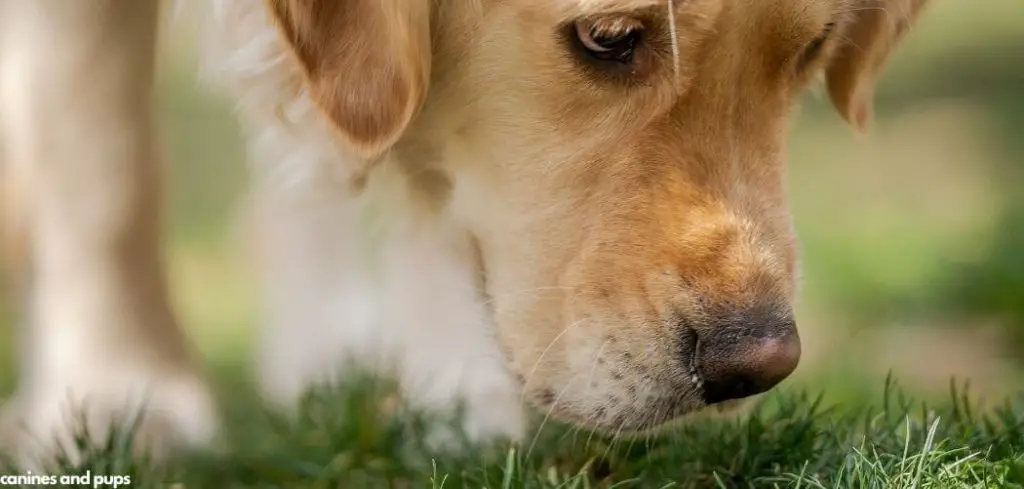When a dog is eating grass excessively and drooling, it can be worrying for any owner. While occasional grass eating can be normal, the combination of excessive drooling suggests something more serious may be happening.
We outline the common reasons why a dog may excessively eat grass and drool, what you can do, and when to seek veterinary help.
Dog Eating Grass Excessively and Drooling — Why It Happens
Dogs may eat grass excessively and drool due to gastrointestinal upset, nausea, poisoning, dental problems, or underlying health conditions. Sometimes, grass eating is a harmless habit, but when combined with excessive drooling, it is usually a red flag.
This behavior may indicate stomach irritation, ingestion of toxins, or even more serious issues like liver or kidney disease. Observing other signs such as vomiting, lethargy, or loss of appetite can provide important clues.

Dog Eating Grass Excessively and Drooling: Common Causes
Gastrointestinal Upset
Dogs often eat grass when they feel nauseous or have an upset stomach. The act of eating grass can sometimes make them vomit, which may relieve discomfort temporarily.
Excessive drooling in this case is usually linked to nausea. You may also notice your dog pacing, licking their lips, or refusing food.
While occasional stomach upset may resolve on its own, persistent symptoms can point to more serious conditions.
Read more: Dog Eating Grass and Excessive Licking (Why it happens)
Toxin Ingestion
If a dog has eaten something toxic, such as pesticides, household chemicals, or poisonous plants, excessive drooling and grass eating may occur together. Grass may be eaten instinctively as a way to induce vomiting.
Toxin ingestion is a medical emergency. Along with drooling, dogs may show signs like trembling, vomiting, diarrhea, or collapse. If poisoning is suspected, urgent veterinary care is essential.
Dental Disease
Oral pain can lead to both drooling and unusual eating behaviors. Dogs with dental infections, gum disease, or tooth abscesses may chew on grass excessively because chewing provides temporary relief.
Excessive drooling is one of the most common signs of dental issues. Bad breath, difficulty eating, or pawing at the mouth often accompany it. Left untreated, dental infections can spread and become very serious.
Nausea from Illness
Dogs with conditions like liver disease, kidney failure, or pancreatitis often experience nausea. Eating grass excessively may be their attempt to cope, while drooling is a clear sign of queasiness.
These systemic illnesses can also cause weight loss, lethargy, vomiting, and changes in thirst or urination. Because these are serious health concerns, prompt veterinary evaluation is important.
Foreign Object in the Throat or Stomach
A dog that has swallowed a non-food item may eat grass in an attempt to push it down or bring it up. Drooling occurs due to irritation in the mouth, throat, or stomach.
If an obstruction is present, you may notice gagging, retching, coughing, or a swollen abdomen. This is a medical emergency and requires immediate veterinary attention.
Heatstroke
In hot weather, a dog may pant heavily, drool excessively, and seek out grass to chew on or eat. Grass eating in this context is often linked to distress and discomfort.
Heatstroke can quickly become life-threatening. Symptoms include rapid breathing, collapse, weakness, and vomiting. Immediate cooling and urgent veterinary care are critical.
What to Do If Your Dog Is Eating Grass Excessively Drooling
If your dog is eating grass excessively and drooling, start by monitoring closely. Remove access to potentially toxic plants or chemicals in the yard. Offer fresh, cool water to help with hydration and soothe nausea.
Do not let your dog eat large amounts of grass unchecked, as it can lead to vomiting or choking. Try offering a bland diet, such as boiled chicken and rice, if the stomach seems upset.
You can also check your dog’s mouth for any visible injuries, foreign objects, or signs of dental problems. If nothing obvious is found and your dog is otherwise acting normal, short-term monitoring may be reasonable.
However, if symptoms persist, worsen, or are accompanied by vomiting, lethargy, or collapse, veterinary care is needed immediately.
When to Call or Visit Your Vet
Seek veterinary care if your dog shows signs of toxin ingestion, persistent vomiting, extreme lethargy, or difficulty breathing. These are emergencies that should never wait.
If your dog continues to eat grass excessively while drooling for more than a few hours, it’s important to schedule an exam. Even if the cause is mild, a vet can provide medications to ease nausea and prevent complications.
Dogs with pre-existing conditions like kidney disease, liver disease, or diabetes should be taken to the vet right away, as they are at higher risk of serious illness when new symptoms develop.
Read more: Dog Eating Grass Excessively (Here’s Why)
Key Takeaway
When a dog is eating grass excessively and drooling, it’s often a sign of nausea, toxins, or another underlying health issue. While occasional grass eating can be harmless, the addition of drooling should never be ignored.
Monitoring at home may be enough for mild cases, but urgent veterinary care is required if other concerning symptoms appear. By paying close attention to your dog’s behavior and acting promptly, you can help ensure their health and safety.
